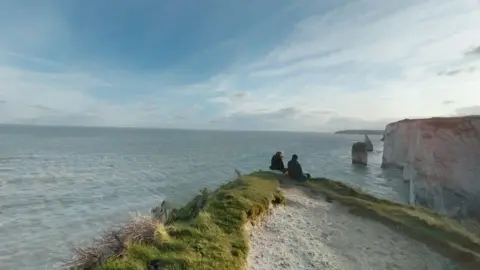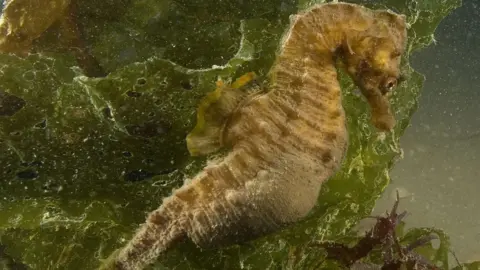Oil exploration drilling planned in Poole Bay
 Google
GoogleAn energy firm plans to drill a well more than 1,000m (3,280ft) below the seabed in Poole Bay in a bid to explore oil reserves.
Corallian Energy hopes to erect a temporary oil platform later this month before drilling the "appraisal well".
Environmentalists have said an accident at the site could "devastate" the coast.
But Corallian said "all practicable measures" would be taken to avoid "spill scenarios".
The 98/11-E well aims to investigate reserves found by British Gas and BP in 1986, called the Colter prospect.
The platform, which would be visible from Bournemouth, Purbeck and the Isle of Wight, and the vertical well are subject to approval by the Department for Business, Energy and Industrial Strategy (BEIS).
Drilling would take place over 45 days. The well would then be plugged and the platform removed.
 Paul Naylor
Paul NaylorIf oil can be economically produced, Corallian proposes extracting it by drilling horizontally from the shore, although such a scheme would require a separate licence.
A petition to Parliament is calling for drilling to be stopped, claiming "a blowout could result in 20 million gallons of leaked oil over thousands of square miles".
But Corallian's environmental report said blowouts - where pressure control systems fail, leading to an uncontrolled flow of oil - were extremely rare and could only happen if procedures and controls were ignored.
However, it acknowledged there had been about 228 smaller spills from mobile offshore drilling units between 1990 and 2005.
In reviewing the environmental statement for the well, BEIS said there were "no valid grounds for objecting to the proposals".
It added the agreement was not subject to the inclusion of any specific environmental conditions.
Dorset Wildlife Trust said it was concerned about the scheme's effect on species in the bay such as protected short-snouted seahorses.
Chief executive Dr Simon Cripps said the money "would be better used on renewable energy alternatives and not drilling in such a sensitive area".
